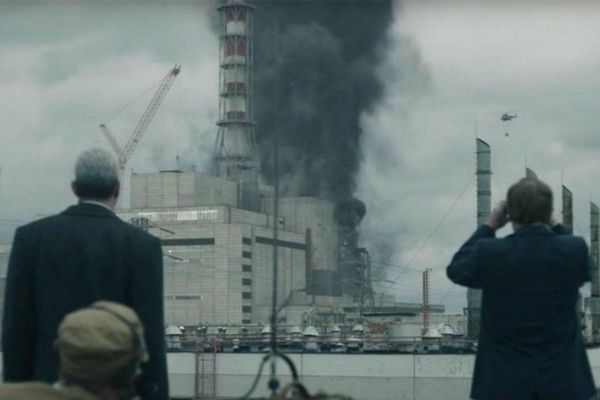- List of the best books, records and movies of 2019
The Chernobyl miniseries is doubly scary, namely: because it is frightening in itself and because what counts was terrifyingly real. And how does it count? Well, there I think one of its many successes resides: a dreadful narrative subject treated with a measured drama, establishing distances with realism, with melodramatism, with catastrophism and with the unnecessary accentuation of the chilling factors of an event that alone it was enough to arouse not only fear, but also a strange and frightened stupor before that chain of unfortunate contingencies that led to a collective tragedy.
That wise dosage of the emotional temperature of the story is right to give it intensity, as well as likelihood, because not always a story based on real events reaches the necessary degree of credibility so that we can assure the cinematographic reconstruction of a verifiable reality.
The simplest way to ruin a fiction around horror is, in short, to choose an emphatic expressive record, to load the inks on what is left over - and excess graphite - by itself. In this case, it is admirable the good pulse of Craig Mazin (its creator and screenwriter) to convert what could have remained in a documentary-based series into a magnificent horror story - especially psychological - in its purest state.
We are facing the staging of a historical event, not a free fantasy, so that its effectiveness as a film product depended on the good management of these difficult balances that requires a fiction built from real events: on the one hand, the scrupulous subjection to the data and, on the other, the aspiration to its intrinsic value as an artistic mechanism. It is hard to imagine that it could have been resolved better. As if that were not enough, the actors are at a level of excellence, especially Jared Harris, which gives his characterization of the scientist Legásov a poignant efficiency: at all times we have the feeling of reading the dizzying movements of his mind, his doubts, his desperate hypotheses, their terrible certainties.
Chernobyl has a lot, he said, of horror history: the fight against a monster. A monster created by humans and against which, when the time comes, humans are forced to fight from a position of weakness: the powers of the spawn, once their fury has been unleashed, failed to calibrate them or their creators. Something like Frankenstein's monster in the form of a nuclear power plant. Something like the dragon that expels poisoned fire through the mouth. Something like that, in sum, as a variant of the legend of Prometheus: someone brought to our planet a matter that was hitherto non-existent, and with it its infinite and incalculable capacity for devastation.
Apart from that, we are offered a subtly severe view of the USSR: an empire that aspired to be paradise on earth and that ended up becoming a bureaucratic and rhetorical hell, apart from literally breaking it apart. A regime that promised equality and that ended up being an ultra-hierarchical, repressive and debased system. (The setting, incidentally, impeccable.)
Today -thanks in part to this series but, above all, thanks to the unlimited level of idiocy that we humans can reach- the area affected by that catastrophe is a kind of amusement park that many people go, on organized tours, to become photographs in picturesque, humorous and even erotic poses. As an eccentric pirouette, it is not bad: to transform the horror scene into a pleasant tourist decoration. And it is that the nucleus of the nuclear reactor that each one carries inside the head can explode at any moment.
Apart from Chernobyl , 2019 has brought us, among the predictable jumble of cheap, several productions that I think are quite good. Let me point out my favorite: The Deuce ( The Times Square Chronicles ), with its crude portrait of the porn industry in the 1970s and the emergence of AIDS in the 1980s; the new season of The Crown , biopic of the British royal family, with its splendid protocol and with its intimate misadventures; the subtly futuristic Years and Years , the final season - somewhat declining, it seems to me - of The Affair , the second season of the acidly funny The Kominsky method , the emotional skein that is Big Little Lies or the dissection of the Israeli-Palestinian conflict which takes place in Our Boys . And, above all that, we have arrived late this year, an Israeli series of 2013: Shtisel , focused on the daily life of an ultra-Orthodox family in a neighborhood of Jerusalem. Especially outstanding, if you allow me what may sound like hyperbole.
Expectants, then, were faced with the 2020 harvest.
May you have much prosperity during the year that appears. Prosperities in series, as if we were saying.
Expert votes
JAVIER BLÁNQUEZ
1. Watchmen (Damon Lindelof on HBO)
2. Fleabag "(Phoebe Waller-Bride on Amazon Prime Video)
3. Chernobyl (Craig Mazin on HBO)
4. After Life (Ricky Gervais on Netflix)
5. Mindhunter (Joe Penhall on Netflix)
ESTHER MUCIENTES
1. Game of Thrones (David Benioff and DB Weiss on HBO)
2. Euphoria (Sam Levinson on HBO)
3. Chernobyl (Craig Mazin on HBO)
4. Paquita Salas (Javier Calvo and Javier Ambrossi on Netflix)
5. Years and years (Simon Cellan Jones and Lisa Mulcahy on HBO)
FELIPE BENÍTEZ REYES
1. Chernobyl (Craig Mazin on HBO)
2. The Deuce (David Simon and George Pelecanos on HBO)
3. Big Little Lies (David E. Kelley on HBO)
4. Years and Years (Russell T. Davis on HBO)
5. Our Boys (Hagai Levi, Joseph Cedar and Tawfik Abu-Wael on HBO)
According to the criteria of The Trust Project
Know more- culture
- Series
- Russia
The Paper Sphere Difficult loves, lumpen and royalty
Mira De Brenda to Dr. Sweets: the real reasons why these series characters died
Series Suddenly dies Jack Burns, actor and dancer of 14 years considered the 'new Billy Elliot'

